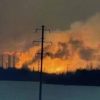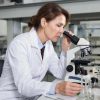The White House doctor says Donald Trump is no longer at risk of transmitting the coronavirus, but has not said whether the US president has tested negative for it.
In a memo released by the White House, Dr Sean Conley said Trump met the Center for Disease Control and Prevention criteria for safely discontinuing isolation and that by “currently recognised standards” he was no longer considered a transmission risk.
The memo did not say whether Trump had tested negative, but stated that a test on Saturday had showed the president was no longer a “transmission risk to others”, and there was no longer evidence “of actively replicating virus”.
Trump returns to public events with ‘law and order’ speech at White House
Read more
Sensitive lab tests — like the PCR test — detect virus in swab samples taken from the nose and throat. Dr William Morice, who oversees laboratories at the Mayo Clinic, said earlier this week that using the PCR tests, the president’s medical team could hypothetically measure and track the amount of virus in samples over time and watch the viral load go down.
Some medical experts had been skeptical that Trump could be declared free of the risk of transmitting the virus so early in the course of his illness. Just 10 days since an initial diagnosis of infection, there was no way to know for certain that someone was no longer contagious, they said.
The memo followed Trump’s first public appearance since returning to the White House after being treated in hospital. Hundreds of people gathered Saturday afternoon on the South Lawn for a Trump address on his support for law enforcement from a White House balcony.
Trump took off his mask moments after he emerged to address the crowd, his first step back onto the public stage with just more than three weeks to go until election day.
He flouted, once more, the safety recommendations of his own government just days after acknowledging that he was on the brink of “bad things” from the virus and claiming that his bout with the illness brought him a better understanding of it.
His return was a brief one. With bandages visible on his hands, likely from an intravenous injection, Trump spoke for 18 minutes, far less than at his normal hour-plus rallies. He appeared healthy, if perhaps a little hoarse, as he delivered what was, for all intents and purposes, a short version of his campaign speech.
“I’m feeling great,” said Trump, who said he was thankful for their good wishes and prayers as he recovered. He then declared that the pandemic, which has killed more than 210,000 Americans, was “disappearing” even though he is still recovering from the virus.
US Covid cases climb as midwestern states report steep increases
Read more
Ireland on Saturday reported 1,012 new cases of Covid-19, the highest number in a day since the start of the pandemic and almost double the average for the past week.
The surge, after a week in which regions of neighbouring Northern Ireland reported some of the highest infection rates in Europe, is likely to increase pressure on the government to impose additional restrictions.
The government has banned indoor restaurant dining and limited the number of visitors to people’s homes, but rejected a recommendation from public health officials to impose a much stricter lockdown.
India is approaching 7 million confirmed cases, with more than 107,000 deaths. Only the US, with 7.7 million infections, has had more cases than India, while its death toll is now the third highest in the world behind the US and Brazil.
Latin America and the Caribbean marked 10 million cases Saturday and with more than 360,000 deaths, the region is the worst hit in terms of fatalities, according to official figures.
In the Australian state of Victoria, premier Daniel Andrews confirmed he would hand over his phone records to an inquiry into the bungled hotel quarantine program that led to the state’s second coronavirus wave.
The phone records, covering 27 March, could help determine who made the crucial decision on that day to use private security guards to monitor returned travellers. “All of us want answers,” Andrews said. “All of us are entitled to answers.”
Victoria reported 12 new cases and one death on Sunday, as Andrews confirmed that some of Melbourne’s stage 4 restrictions would be eased on 19 October.
In France, health authorities reported a record 27,000 new infections in a single day Saturday, although numbers in intensive care remained far short of peaks seen in spring.
Spiralling cases have led to fears that the French government may need to impose local lockdowns in major cities, which are the epicentres of the disease, mirroring measures already announced in Spain where the government has prevented people leaving the Madrid region.
In other developments:
-
Mainland China reported 21 new confirmed cases of the novel coronavirus on Sunday, up from 15 a day earlier, the country’s national health authority said.
-
Berlin’s 11pm curfew on bars and restaurants came into effect, with the capital following in the footsteps of financial hub Frankfurt where a curfew had already been imposed. Germany reported 3,483 new cases on Saturday.






















































Свежие комментарии